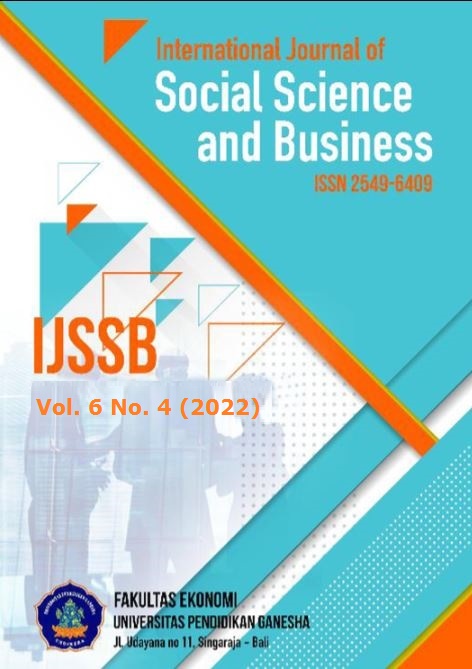The Hegemony of Public Service Practices in the Perspective of Power Dualism of Traditional Villages and Government Villages
DOI:
https://doi.org/10.23887/ijssb.v6i4.51324Keywords:
Dualism, Power, Public Service, Traditional Village And Government VillageAbstract
In Bali, they there know the terms government village and traditional village. In the government village, there are hamlets and neighbourhood heads, the top leader, Perbekel. Traditional villages consist of Banjar, and each has a kelian. The top leader is called the bendesa. Traditional villages have their courts called kerta desa and various regulations, including awig-awig as the basic law, perarem as law, and other regulations. There is a village police called Pecalang to enforce the rules. This dualism often raises the question of how Bali maintains the village's existence in the tendency of increasingly narrow distances, spaces, and boundaries of assimilation between humans, which must be sorted based on the status of traditional krama, krama tamiu, and tamiu. This paper describes the shackles of public services on the dualism axis of power in traditional and government villages. The shackles referred to in this paper illustrate how strong the policy dominance between the traditional and government villages is and the hegemony of public service access policies below the implementation level. The dualism of power, which both have the authority to determine and regulate the society within their sphere of power. The dualism of interests towards the same object in different ways in carrying out service tasks to the community. In the end, it impacts the mechanism of country and community relations between government villages and traditional villages. The public service mechanism with the dualism of power in Bali is unique and attracts readers' attention, especially those outside Bali.
References
Agustina, D. P. (2021). Peningkatan Kualitas Pelayanan Publik Melalui Implementasi E-Government di Bali. Ekuitas: Jurnal Pendidikan Ekonomi, 9(2), 424–430. https://doi.org/10.23887/ekuitas.v9i2.42044. DOI: https://doi.org/10.23887/ekuitas.v9i2.42044
Bernauer, W., & Roth, R. (2021). Protected areas and extractive hegemony: A case study of marine protected areas in the Qikiqtani (Baffin Island) region of Nunavut, Canada. Geoforum, 120, 208–217. https://doi.org/10.1016/j.geoforum.2021.01.011. DOI: https://doi.org/10.1016/j.geoforum.2021.01.011
Bisri, M. H., & Asmoro, B. T. (2019). Etika Pelayanan Publik di Indonesia. Journal of Governance Innovation, 1(1), 59–76. https://doi.org/10.36636/jogiv.v1i1.298. DOI: https://doi.org/10.36636/jogiv.v1i1.298
Dewi, R. C., & Suparno, S. (2022). Mewujudkan good governance melalui pelayanan publik. Jurnal Media Administrasi, 7(1), 78–90. https://doi.org/10.56444/jma.v7i1.67. DOI: https://doi.org/10.56444/jma.v7i1.67
Heath, R. L., & Waymer, D. (2021). University Engagement for Enlightening CSR: Serving Hegemony or Seeking Constructive Change. Public Relations Review, 47(1), 101958. https://doi.org/10.1016/j.pubrev.2020.101958. DOI: https://doi.org/10.1016/j.pubrev.2020.101958
Herizal, H., Mukhrijal, M., & Wance, M. (2020). Pendekatan akuntabilitas pelayanan publik dalam mengikuti perubahan paradigma baru administrasi publik. Journal of Governance and Social Policy, 1(1), 24–34. https://doi.org/10.24815/gaspol.v1i1.17327. DOI: https://doi.org/10.24815/gaspol.v1i1.17327
Johnson, R. E., Lacoste, S., & Meehan, J. (2020). Hegemony in asymmetric customer-supplier relationships. Industrial Marketing Management, 87, 63–75. https://doi.org/10.1016/j.indmarman.2020.01.013. DOI: https://doi.org/10.1016/j.indmarman.2020.01.013
Mahayoni, G. A. D. I., & Wirantari, I. D. A. P. (2021). Pengembangan Website Desa Dalam Meningkatkan Kualitas Pelayanan Publik di Desa Bona, Gianyar. Journal of Contemporary Public Administration (JCPA), 1(1), 13–19. https://doi.org/10.22225/jcpa.1.1.3311.13-19. DOI: https://doi.org/10.22225/jcpa.1.1.3311.13-19
Musdalipa, M., Parawangi, A., & Malik, I. (2017). Kualitas Pelayanan Publik Di Kantor Desa Parigi Kecamatan Tinggimoncong Kabupaten Gowa. Kolaborasi: Jurnal Administrasi Publik, 3(1), 47–62. https://doi.org/10.26618/kjap.v3i1.893. DOI: https://doi.org/10.26618/kjap.v3i1.893
Nyttingnes, O., Nyttingnes, O., Rugkåsa, J., & Rugkåsa, J. (2021). The Introduction of Medication-Free Mental Health Services in Norway: An Analysis of the Framing and Impact of Arguments From Different Standpoints. FRONTIERS IN PSYCHIATRY, 12. https://doi.org/10.3389/fpsyt.2021.685024. DOI: https://doi.org/10.3389/fpsyt.2021.685024
Rukmawati, D., Sudana, I. W., & Janamijaya, I. G. (2018). Perubahan Paradigma Berotonomi Daerah Pasca Hegemoni Negara Di Kota Denpasar. SINTESA (Jurnal Ilmu Sosial Dan Ilmu Politik), 9(2), 60–63. https://doi.org/10.22225/sintesa.9.2.1289.60-63.
Scheiring, G., & Szombati, K. (2020). From neoliberal disembedding to authoritarian re-embedding: The making of illiberal hegemony in Hungary. International Sociology, 35(6), 721–738. https://doi.org/10.1177/0268580920930591. DOI: https://doi.org/10.1177/0268580920930591
Widianti, I. (2019). Kualitas Pelayanan Publik Pada Kantor Desa Bayasari Kecamatan Jatinagara Kabupaten Ciamis. Dinamika: Jurnal Ilmiah Ilmu Administrasi Negara, 6(4), 214–230. https://doi.org/10.25157/dinamika.v6i4.3090.
Yulianti, T. R. (2014). Peranan Orang Tua Dalam Mengembangkan Kreativitas Anak Usia Dini. Jurnal Ilmiah Program Studi Pendidikan Luar Sekolah, 3(1), 11–24. https://doi.org/10.22460/empowerment.v3i1p11-24.569.
Downloads
Published
How to Cite
Issue
Section
License
Copyright (c) 2022 I Nengah Merta, Ni Luh Putu Erma Mertaningrum

This work is licensed under a Creative Commons Attribution-ShareAlike 4.0 International License.











